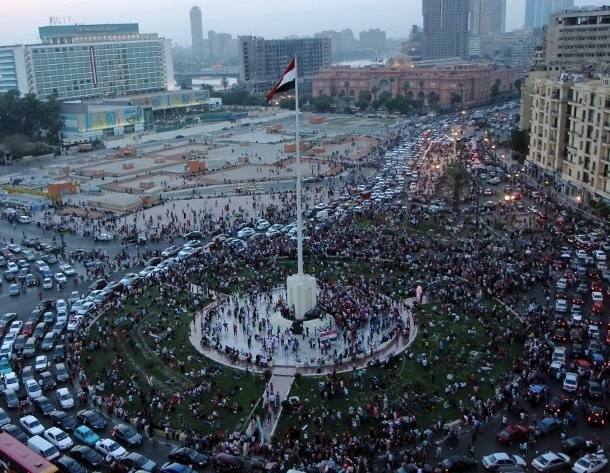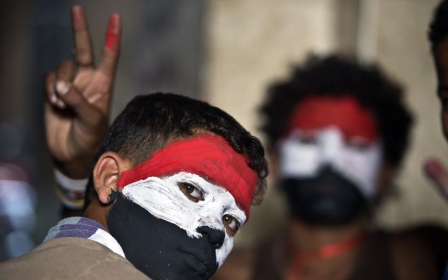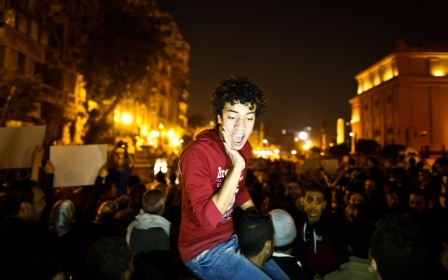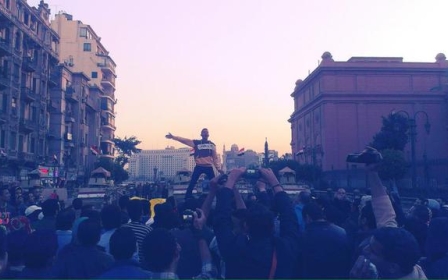Oppression in Egypt 'worse than before' but few have appetite to fight

Five years ago, some two million Egyptians took to the streets of the capital to demand an end to the government of Hosni Mubarak, but no such spectacle is expected this time around.
Instead of celebrating the fifth anniversary of the 25 January uprising, many young Egyptians say they will stay home and lament the death of their revolution, which they say has been marred by human rights abuses and growing state repression.
“We are not protesting now because there is no use in doing so … more people will die and get put in jail,” said Amal Sharaf, a spokeswoman for the April 6 movement that was a key force behind the 2011 protests that brought down the long-time strongman.
While no one expected the transition to democracy to be smooth, many activists say things are more dangerous now than they were under Mubarak.
During the revolution, activists and protesters took risks. For weeks they endured intimidation and violence from the authorities. According to Health Ministry officials, more than 840 were killed and almost 6,500 injured, but day after day they turned out to protest.
Many 25 January veterans say they have lost their revolutionary zeal and been worn down by years of crackdowns and increased police brutality.
“During Mubarak’s era, the worst that could happen is [you would get arrested and] tortured for a few days while [they carried out their investigation] over national security,” Sharaf said. “Now [the government] kidnaps, hands out crazy sentences and fabricates charges.
“Now is not the time for more confrontations. The oppression we see now is worse than anything we saw before,” she said.
About half of the April 6 movement and other revolutionary figures have been imprisoned, while the rest are being threatened with detention, Sharaf said. Ahead of the anniversary, three leaders were rounded up and imprisoned for calling through social media for people to return to Tahrir Square.
The Anti-Coup Alliance, made up primarily of the Muslim Brotherhood and a string of Islamist parties, had tried to reignite the movement, calling for a wave of protests dubbed “Together We Stand” ahead of the anniversary, but so far few have heeded their call, with the Students Against the Coup (SAC) group reporting small demonstrations “against police violations” in various governorates, including Sharqeya, Qalubiya, Beheira and Gharbia.
After Mubarak’s demise, Egypt’s powerful military took control until elections were called. When voting took place in 2012, Muslim Brotherhood candidate Mohamed Morsi was elected president by a small margin in an election widely accepted as free and fair. His short rule was turbulent, marred by economic problems and a deep-seated fear of Islamist rule.
A year in, hundreds of thousands of people once again erupted onto the streets to demand Morsi’s removal. The army swept in, claiming to represent the will of the people, and removed and imprisoned him.
Few of those who demonstrated against Morsi were prepared for what came next. Human rights groups estimate that 40,000 people, largely Muslim Brotherhood supporters, were thrown into prison. Hundreds were sentenced to death in controversial mass trials, although some of those sentences were overturned. More than 1,250 people died in police crackdowns on mostly peaceful protests, which Human Rights Watch has called possible crimes against humanity.
The Muslim Brotherhood has been hardest hit, but liberal, left-wing and youth groups have also been targeted by state clampdowns. The Muslim Brotherhood was outlawed and designated a “terrorist group” in 2013, with the April 6 movement also being banned in 2014.
In the run-up to the revolution’s fifth anniversary, Muslim Brotherhood spokesman Mohamed Montaser said in a statement that the group supported “any sincere calls seeking to restore the democratic gains of the revolution: freedom, social justice and human dignity, while ensuring criminal putschists receive fair and prompt punishment, the coup is ended, and Mohamed Morsi is reinstated as the president".
'Any regular day'
Maryam, who declined to give her name for security reasons, told Middle East Eye that in 2014 she was arrested for protesting at the al-Azhar University campus and detained for months without being charged. The 20-year-old was eventually released, but her university expelled her.
“Everyone thinks it [the anniversary] is going to pass just like any regular day … even if something does happen, it won’t have any effect, it’ll just happen and pass,” she said. “Maybe they’ll release a few people from prison … but as [far as] real change [goes], no.”
The danger of bringing politics to the campus – a traditional breeding ground for change – has prompted many young people to back down. In the academic year of 2014/15 security forces arrested at least 761 students, many inside and around their university campuses, and others in their homes, according to the Association for Freedom of Thought and Expression (AFTE).
“This is the most we can hope for now, that the sentences against [students] are dropped and that we can go back to our universities,” Maryam said.
Mohamed Abdelsalam, a researcher on student movements and academic freedom with the AFTE, said there were no significant calls for student protests on the anniversary.
Instead, they are choosing to act in other, less confrontational ways.
“Islamist and Muslim Brotherhood students, generally, do not have the capacity to sacrifice more students and are avoiding protests,” Abdelsalam said, adding that many students from these movements had already been killed or arrested.
Other student groups are trying to carve out small spaces where they can begin to operate. The Revolutionary Socialists group and students supporting the liberal al-Dostour party have moved their political work to student-union elections, trying to spread awareness about issues such as political prisoners and democratic freedoms.
Despite a low expectancy of action on 25 January, security forces have continued to arrest activists. “The state is really nervous and tense because they understand that they do not have real legitimacy,” Abdelsalam said.
Tough new laws
Residents of central Cairo near Tahrir Square complained on social media on 16 and 17 January that security forces had raided homes in the neighbourhood and looked through people’s mobile phones and laptops. Government sources told Egyptian news outlets that they “inspected” 5,000 apartments as part of security plans ahead of the anniversary.
Egypt’s Ministry of Foreign Affairs has written about the “accomplishments of the January 25th revolution” on a hashtag that it has called “Egypt Today Is Better". Under this slogan, the ministry listed “the guarantee of political rights and participation”.
Egypt’s new parliament is scheduled to review laws issued in its absence under the auspices of former interim president Adly Mansour and current President Abdel Fattah al-Sisi. Rights groups have called on the parliamentarians to reject the protest law but controversial anti-terrorism and prison laws have already been ratified.
The anti-terrorism law sets up special courts, imposes new penalties for people involved in “terror-related” activities, and punishes the publishing of “false news or data," that contradicts “official data".
Local and international rights groups as well as journalists have criticised the law because it can target anyone that speaks against the government's official narrative. The prison law, on the other hand, has been criticised for granting prison administrators further authority to use force against detainees.
The cabinet has also approved a draft law criminalising “terrorist symbols,” the state-owned MENA news agency reported earlier this month. The law is more specifically targeted at Brotherhood and 6 April symbols such as the four-fingers commemorating the Rabaa massacre, and the clenched fist that symbolises the 6 April movement.
Sharaf said that regardless of the current situation, a “revolutionary wave is inevitable even if does not happen this January 25th ... because [the] oppression is bad, and because all the reasons people protested [in 2011] are still there and are even worse.”
Despite all of this, she said: “January 25th will always be the greatest day in history.”
Middle East Eye propose une couverture et une analyse indépendantes et incomparables du Moyen-Orient, de l’Afrique du Nord et d’autres régions du monde. Pour en savoir plus sur la reprise de ce contenu et les frais qui s’appliquent, veuillez remplir ce formulaire [en anglais]. Pour en savoir plus sur MEE, cliquez ici [en anglais].




